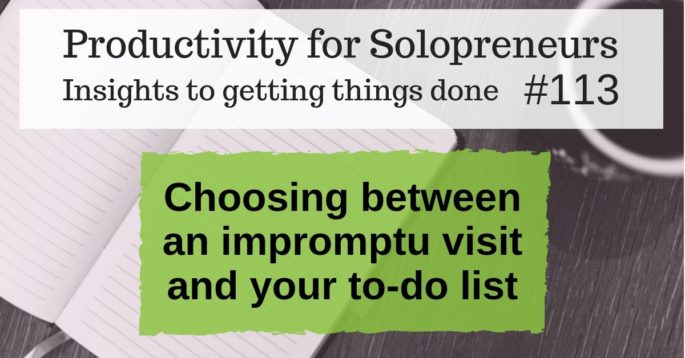I was searching through my blog archives last week and came across something I wrote seven years ago that really stuck with me.
It’s about what to do with impromptu visits.
Those “hey, I’m in town today, want to grab some lunch” type of unexpected invitations.
For me, they usually come from family members.
And I’m a planner. I like to have appointments on my schedule at least a week in advance and my tasks for the week outlined before Monday morning.
When I get an impromptu visit or lunch request, it can feel like someone took a large cartoonish wrench and threw it into my well planned and thought out week.
Do I want to spend time with them? YES!
AND I want to get the things I had planned for the week done too.
The problem is if I always say no last-minute requests of my time, I might not have an opportunity to see that person again for a few months.
I don’t know about you, but one of the reasons having my own business was appealing was that I could occasionally enjoy these impromptu visits.
So, if I say no to these visits, am I honoring my schedule and plans or am I being too tied to them?
Here’s what we forget about our to-do lists, schedules, and plans sometimes: they are there to help you and work for you. You do not work for them.
It sounds a little weird to say it like that, but sometimes in our quest to get as much done as we can each day, we forget that there are other things to do.
Life doesn’t always fit in nice little compartments and since you’re reading this, I’m guessing you really don’t want it too. You want a life with flexibility.
This doesn’t mean it’s always easy to put aside my plans for the week and have brunch with family instead. I have things! that must be done! And if I start my day late, those things! Might not get done! (does anyone else’s brain work like this? Or is it just me?)
This is when it’s helpful for me to take a breath and realize that if there are no appointments scheduled, then the things! can be done later.
When I have impromptu visits and my mind is ping-ponging between GO have fun and STAY to complete the things! I ask myself these questions:
- Are there any appointments or meetings that this will overlap or interfere with?
- Are there any deadlines approaching that will be negatively impacted?
- Have I already spent time this week with unplanned visits?
- How will this impact progress on my goals?
The gist of these questions is: will my business or goals be negatively affected by spending time elsewhere?
If so, is spending this time with this person more important than my business and/or goals?
Notice that I wrote “is spending this time with” and not “is spending time with.” That one little word changes the meaning of the sentence a bit.
Again, your schedule and to-do list are meant to help guide you and make your day flow smoothly.
They are not a ball and chain that keep you tied to your office or computer.
If you’re treating them like that, step back, get curious and ask yourself why.
Leave a comment letting me know when was the last time you said yes to an impromptu visit.
And if your schedule and to-do list feel like a ball and chain or if it feels impossible to say yes to an impromptu visit, then reach out and let’s talk. The easiest way to do that is to leave a comment or fill out the Contact Me form here.




